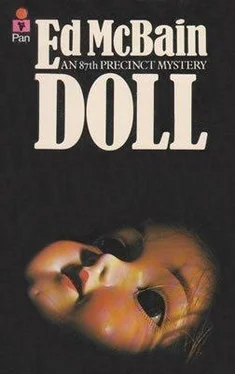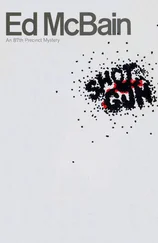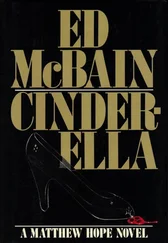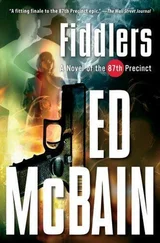It was April.
The tom and lovely woman lay in profile across the bloody face of the Chagall painting. The lab technicians were dusting for latent prints, vacuuming for hairs and traces of fiber, carefully wrapping for transportation the knife found in the corridor just outside the bedroom door, the dead girl’s pocket book, which seemed to contain everything but money.
Detective Steve Carella made his notes and then walked out of the room and down the hall to where the little girl sat in a very big chair, her feet not touching the floor, her doll sleeping across her lap. The little girl’s name was Anna Sachs — one of the patrolmen had told him that the moment Carella arrived. The doll seemed almost as big as she did.
‘Hello,’ he said to her, and felt the old confusion once again, the exhaustion because he had not been home since Thursday morning, the tedium because he was embarking on another round of routine questioning, and the disgust because the person he was about to question was only a little girl and her mother was dead and mutilated in the room next door. He tried to smile. He was not very good at it. The little girl said nothing. She looked up at him out of very big eyes. Her lashes were long and brown, her mouth drawn in stoic silence beneath a nose she had inherited from her mother. Unblinkingly, she watched him. Unblinkingly, she said nothing.
‘Your name is Anna, isn’t it?’ Carella said.
The child nodded.
‘Do you know what my name is?’
‘No.’
‘Steve.’
The child nodded again.
‘I have a little girl about your age,’ Carella said. ‘She’s a twin. How old are you, Anna?’
‘Five.’
‘That’s just how old my daughter is.’
‘Mmm,’ Anna said. She paused a moment, and then asked, ‘Is Mommy killed?’
‘Yes,’ Carella said. ‘Yes, honey, she is.’
‘I was afraid to go in and look.’
‘It’s better you didn’t.’
‘She got killed last night, didn’t she?’ Anna asked.
‘Yes.’
There was a silence in the room. Outside, Carella could hear the muted sounds of a conversation between the police photographer and the m.e. An April fly buzzed against the bedroom window. He looked into the child’s upturned face.
‘Were you here last night?’ he asked.
‘Um-huh.’
‘Where?’
‘Here. Right here in my room.’ She stroked the doll’s cheek, and then looked up at Carella and asked, ‘What’s a twin?’
‘When two babies are born at the same time.’
‘Oh.’
She continued looking up at him, her eyes tearless, wide, and certain in the small white face. At last she said, ‘The man did it.’
‘What man?’ Carella asked.
‘The one who was with her.’
‘Who?’
‘Mommy. The man who was with her in her room.’
‘Who was the man?’
‘I don’t know.’
‘Did you see him?’
‘No. I was here playing with Chatterbox when he came in.’
‘Is Chatterbox a friend of yours?’
‘Chatterbox is my dolly, ’ the child said, and she held up the doll and giggled, and Carella wanted to scoop her into his arms, hold her close, tell her there was no such thing as sharpened steel and sudden death.
‘When was this, honey?’ he asked. ‘Do you know what time it wa s ?’
‘I don’t know,’ she said, and shrugged. ‘I only know how to tell twelve o’clock and seven o’clock, that’s all.’
‘Well… was it dark?’
‘Yes, it was after supper.’
‘This man came in after supper, is that right?’
‘Yes.’
‘Did your mother know this man?’
‘Oh, yes,’ Anna said. ‘She was laughing and everything when he first came in.’
‘Then what happened?’
‘I don’t know.’ Anna shrugged again. ‘I was here playing.’
There was another silence.
The first tears welled into her eyes suddenly, leaving the rest of the face untouched; there was no trembling of lip, no crumbling of features, the tears simply overspilled her eyes and ran down her cheeks. She sat as still as a stone, crying soundlessly while Carella stood before her helplessly, a hulking man who suddenly felt weak and ineffective before this silent torrent of grief.
He gave her his handkerchief.
She took it wordlessly and blew her nose, but she did not dry her eyes. Then she handed it back to him and said, Thank you,’ with the tears still running down her face endlessly, sitting stunned with her small hands folded over the doll’s chest.
‘He was hitting her,’ she said. ‘I could hear her crying, but I was afraid to go in. So I… I made believe I didn’t hear. And then… then I really didn’t hear. I just kept talking with Chatterbox, that was all. That way I couldn’t hear what he was doing to her in the other room.’
‘All right, honey,’ Carella said. He motioned to the patrolman standing in the doorway. When the patrolman joined him, he whispered, ‘Is her father around? Has he been notified?’
‘Gee, I don’t know,’ the patrolman said. He turned and shouted, ‘Anybody know if the husband’s been contacted?’
A Homicide cop standing with one of the lab technicians looked up from his notebook and said, ‘He’s in Arizona. They been divorced for three years now.’
Lieutenant Peter Byrnes was normally a patient and understanding man, but there were times lately when Bert Kling gave him a severe pain in the ass. And whereas Byrnes, being patient and understanding, could appreciate the reasons for Kling’s behavior, this in no way made Kling any nicer to have around the office. The way Byrnes figured it, psychology was certainly an important factor in police work because it helped you to recognize that there were no longer any villains in the world, there were only disturbed people. Psychology substituted understanding for condemnation. It was a very nice tool to possess, psychology was, until a cheap thief kicked you in the groin one night. It then become somewhat difficult to imagine the thief as a put-upon soul who’d had a shabby childhood. In much the same way, though Byrnes completely understood the trauma that was responsible for Kling’s current behavior, he was finding it more and more difficult to accept Kling as anything but a cop who was going to hell with himself.
‘I want to transfer him out,’ he told Carella that morning.
‘Why?’
‘Because he’s disrupting the whole damn squadroom, that’s why,’ Byrnes said. He did not enjoy discussing this, nor would he normally have asked for consultation on any firm decision he had made. His decision, however, was anything but final, that was the damn thing about it. He liked Kling, and yet he no longer liked him. He thought he could be a good cop, but he was turning into a bad one. ‘I’ve got enough bad cops around here,’ he said aloud.
‘Bert isn’t a bad cop,’ Carella said. He stood before Byrnes’s cluttered desk in the comer office and listened to the sounds of early spring on the street outside the building, and he thought of the five-year-old girl named Anna Sachs who had taken his handkerchief while the tears streamed down her face.
‘He’s a surly shit,’ Byrnes said. ‘Okay, I know what happened to him, but people have died before, Steve, people have been killed before. And if you’re a man you grow up to it, you don’t act as if everybody’s responsible for it. We didn’t have anything to do with his girl friend’s death, that’s the plain and simple truth, and I personally am sick and tired of being blamed for it.’
‘He’s not blaming you for it, Pete. He’s not blaming any of us.’
‘He’s blaming the world, and that’s worse. This morning, he had a big argument with Meyer just because Meyer picked up the phone on his desk. I mean, the goddamn phone was ringing, so instead of crossing the room to his own desk, Meyer picked up the closest phone, which was on Kling’s desk, so Kling starts a row. Now you can’t have that kind of attitude in a squadroom where men are working together, you can’t have it, Steve. I’m going to ask for his transfer.’
Читать дальше












